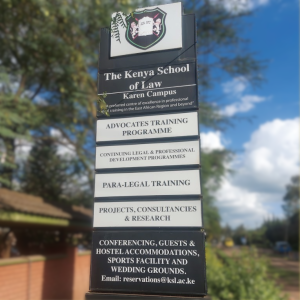INTRODUCTION
Artificial intelligence has emerged as one of the key aspects to modern day life in the 21st century and it is practically everywhere you look making it borderline unavoidable. According to Google Cloud, artificial intelligence can be defined as a set of technologies that enable computers to perform a variety of advanced functions, including the ability to see, understand and translate spoken and written language, analyze data, make recommendations and more[1]. As stated above, artificial intelligence is a key part to modern society and it will inevitably impact all the sectors of the economy more so the legal profession which plays a crucial role in the ease of doing business.
In this article, I will delve into how legal practitioners can leverage the power of artificial intelligence (hereinafter referred to as AI) to not only improve service delivery but also increase revenues. I will also look at some of the pitfalls advocates need to be weary of even as they look to incorporate AI into their firms. Let’s dive right in.
MAIN BODY
How AI can be leveraged within a law firm set up to increase output, client satisfaction and increase revenues
Increased output
From the definition of AI above, it is clear to see that computers are the base of all AI. Law firms are not strangers to computers therefore they are already poised to tap into the power of AI. In a law firm environment, partners and associates are normally under immense pressure to ensure that they are productive and have good turnaround time for the work they do. A majority of work done in a law firm involves research which is mostly used to advice clients or prepare documents.
The vast majority of AI tools available online can easily aid partners and associates with regards to research. In Kenya for example, if you search for legal-based AI platforms on Google, you will find some like Wakili AI and Sheriaplex which can respond to a reasonably vast range of legal questions within seconds. Before embarking on the process of writing this article, I was able to experience some of these platforms and the responses I got for tough legal questions and for easier legal questions had a high degree of accuracy.
Such AI platforms could really help law firms reduce the amount of time spent doing research and preparing documents thus improving output. The same has been proven to be true and correct based on surveys conducted involving legal practitioners. In a survey known as Future of Professionals Report 2024, legal professionals stated that the use of AI tools could save them up to 4 hours a week while generating $100,000/= in billable time per lawyer annually[2].
In a law firm environment, time is money therefore anytime saved means more revenue for the firm and more time to concentrate on complex legal matters.
It also has to be noted that whereas AI tools can help with legal research, legal practitioners need to exercise due diligence and thoroughly scrutinize the research information given to them by the AI platform. Advocates need to remember that they owe a duty to their clients of utmost competence and any breach of that duty be it through their own doing or the AI’s doing, could have serious consequences on them.
The legal-based AI tools available in Kenya can also help law firms eliminate time wastage by alleviating the burden of clerical work on partners and associates. In a law firm, there are those minuscule yet crucial tasks that need to be carried out such as preparing hearing notices, mention notices and diarizing of new court dates. These tasks do not involve any legal knowledge and take up so much time which could have been better used on other complex legal issues.
One of the legal-based AI tools available in Kenya is able to prepare a mention notice if fed with all the details of the case and the same can be easily copied and printed just like a mention notice created by a human from scratch. The amount of time a law firm can save if it allows the small tasks to be carried out by AI is significant and will most definitely improve the quality of the partners and associates’ output.
If a law firm is able to concentrate on the complex legal issues affecting its matters and avoid the distractions of the small yet important tasks, it will improve the quality of work done, but also improve client satisfaction[3].
Given the cut-throat competition in the legal profession, law firms must take into consideration how they can use AI to increase output to enable them keep up with the demands of the profession and keep clients happy.
Client satisfaction
In Kenya, advocates are not allowed to publicly advertise their services as per the law therefore word of mouth is the most powerful marketing tool for a law firm. The only way a law firm is able to generate positive word of mouth is through client satisfaction. A disgruntled and dissatisfied client will never recommend a law firm to his or her friends, colleagues and family members.
The best way to keep a client satisfied, is by providing regular updates and displaying competence in the work done. AI can help advocates keep clients satisfied by fulfilling tasks such as client updates and appointment scheduling. One of the legal-based AI tools available in Kenya is able to properly draft an update letter if fed with the details of the case and the same can be created within a matter of seconds.
Such power can really help a law firm stand out and since the update letters have been generated by AI and not a human, they are devoid of any grammatical or arithmetic errors which may taint the image of the law firm.
Humans are impatient and curious in nature and if their needs are satisfied in a timely and competent manner their impression of you will inevitably improve.
AI can also be programmed to help advocates with regular file bring ups which will help them avoid the treacherous abyss of having dormant files which could lead to dismissal of cases in court and far worse consequences such as disciplinary proceedings before the Advocates Disciplinary Tribunal and Advocates Complaints Commission from disgruntled clients.
Every law firm’s portfolio of clients is diverse and that may include clients who are foreigners or clients who may not be conversant with the official languages of English and Kiswahili. This in itself is a challenge which AI can easily solve for law firms and keep clients satisfied. If a law firm incorporates AI into its practice, it ensures that it can now take instructions from any corner of the planet and not be worried about a language barrier. Elimination of language barrier ensures ease of communication which results in a happy client who will undoubtedly spread the good word on how futuristic and advanced a law firm’s operations are.
In an industry where the client’s satisfaction is of utmost importance, law firms cannot afford to rest on their laurels and pigeon-hole themselves to archaic and outdated means of relating to their clients, they have to be constantly adapting.
Increase revenues
A law firm is a business just like any other and it needs to generate revenue and make a profit. Regardless of whether the law firm is a partnership or a sole proprietorship, it always has to constantly come up with ways to increase revenues especially where you can’t publicly advertise like in Kenya.
AI can help law firms diversify their clientele, retain happy clients, improve workforce output and enhance efficiency all which will increase revenues. As pointed out earlier in this article, advocates can use AI to free up so much time which can be used to get more clients and more high-paying instructions.
Incorporation of AI will also heighten a law firm’s image which will go a long way in ensuring positive word of mouth.
Given that most legal-based AI platforms are free of charge or cost very little in terms of subscription, they will not significantly increase the burden on operating costs for the law firm and will most certainly have a net profit if implemented properly.
From the above it is quite clear to see that the legal profession will inevitably be impacted by the evolution of AI and legal practitioners have many opportunities to leverage the power of AI to grow their firms. Ignoring AI would be very naive as it is always growing and getting better and it will be a key part of the legal practice and society moving forward.
Is AI a threat to legal practitioners and employment opportunities in the legal profession going forward?
Having seen the ways in which AI can help legal practitioners it is also important to consider whether it is a threat to the legal profession and whether it will take away employment opportunities in the profession going forward.
The biggest fear the general population has had since the inception of AI is that it is here to take over and take jobs away from hardworking members of society. With regards to the legal profession, the biggest and most evident threat is that people will no longer seek legal advice from advocates when they can easily access it from their smart devices which are readily available.
The legal-based AI platforms in Kenya are accessible by simply searching for them on Google. That takes less time and money compared to visiting an advocate at his or her chambers. This will therefore make the general population more comfortable to go for the AI platform than the advocate, with the added bonus of keeping their legal troubles private.
The other threats to the legal profession include the veracity of the information contained in the AI platform and the issue of data protection in this day and age of increased cybercrimes which are self-explanatory.
Despite the above challenges and threats, the legal profession has been able to hold its own and is yet to be completely consumed by the power of AI and this is because the law and the legal profession are always dynamic.
The legal profession involves more than just the knowledge of the law, it involves critical thinking, legal strategy, interpersonal skills, ethical thinking among others. AI as we know it today, has not yet been programmed to have all these other skills outside of knowledge therefore, it will not be able to effectively replace a human advocate[4].
As David Halliwell and Mike McGlinchey put out in their article Artificial intelligence taking growing role in legal sector, lawyers routinely analyse risks, anticipate counterarguments, and creatively navigate complex situations using skills honed through years of case-specific experience. This therefore means that no matter how advanced AI may get, it will always be lacking human elements or empathy, ethics, experience and creativity. There are also aspects of the legal profession such commissioning, attestation and notarization of documents which can only be legally done by a human advocate.
The employment opportunities in the legal profession are therefore safe from the immediate threats of the advancements of AI however it is vital that future generations of advocates do not rest on their laurels and ensure they keep growing their human elements to ensure that there will always be a difference. The same is evident from a quote from one of the developers of a legal-based AI platform here in Kenya which is as follows;
“There are lawyers who are not receptive to this because they think it is going to replace them. But we say Wakili is not replacing lawyers. It’s making lawyers up their game, it will make it easier for lawyers not to charge their clients legal fees which they necessarily don’t need to charge them. It is going to democratise law so that it’s not a preserve of a few,”[5]
It is therefore incumbent on legal practitioners to keep evolving themselves and bettering themselves even as they leverage on AI not only for a better legal profession but also for a much better society.
- CONCLUSION
From the foregoing, it is evident that AI has an impact on the legal profession. The impact could be positive based on how the legal practitioners decide to use the technology and the level of due diligence exercised before putting all the faith in its content.
I however cannot ignore the fact that the legal profession has to have an eye on what the public is consuming from these legal-based AI platforms. It would be highly detrimental to the legal landscape of the country if the content produced by the AI platform is false and incorrect.
In my opinion, leveraging the power of AI will be a net positive. It will improve output, increase revenue and significantly reduce the immense pressure in the legal profession. My recommendations on how the legal profession can improve the incorporation of AI into the legal profession are as follows;
- The Law Society of Kenya has to license all current and future developers of legal-based AI platforms and verify that their responses and content are accurate at all times.
- The Law Society of Kenya has to sensitize the public that in as much as they consult AI tools for legal advice, they still need to consult an advocate to avoid the risks presented by misinformation given that a majority of AI developers are not trained advocates.
- Regulate the incorporation of AI into the legal profession by making the necessary amendments to the Advocates Act. It is vital that there be parameters on how advocates can use AI to avoid lapses in the standards of practicing law in Kenya.
In this day and age when technology is growing and expanding at the speed of light, it is important not to be left behind.
© All rights reserved by the author Stanley Gathaga Mwangi

16th April 2025
DISCLAIMER
This article is solely for educational purposes and should not be construed howsoever as legal advice. In case of any queries or consultation, feel free to reach the litigation department through the email info@ckadvocates.co.ke or Tel 0723403703/0703240153
BE IN THE KNOW!
Subscribe to our newsletter updates via https://ckadvocates.co.ke/
[1] https://cloud.google.com/learn/what-is-artificial-intelligence
[2] https://legal.thomsonreuters.com/blog/how-ai-is-transforming-the-legal-profession/
[3] https://www.pinsentmasons.com/out-law/analysis/artificial-intelligence-growing-role-legal-sector
[4] https://www.pinsentmasons.com/out-law/analysis/artificial-intelligence-growing-role-legal-sector
[5] https://www.citizen.digital/news/kenyan-it-guru-builds-ai-powered-super-lawyer-with-knowledge-of-all-kenyan-laws-n329438










